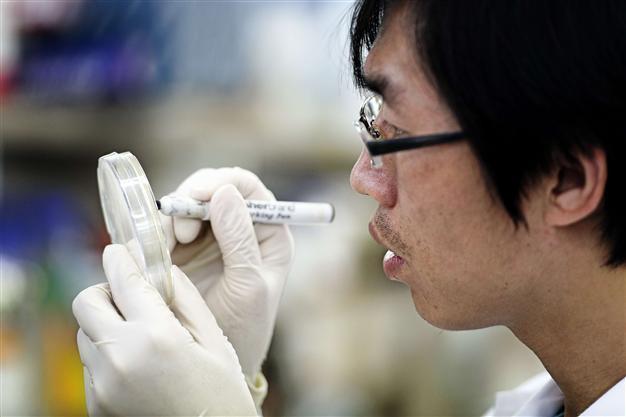No travel measures despite SARS-like virus toll
GENEVA - Agence France-Presse

This picture taken on March 11, 2013 shows a man working at a laboratory of Hong Kong University's Department of Microbiology at Queen Mary Hospital in Hong Kong. The Severe Acute Respiratory Syndrome (SARS) outbreak killed 299 people in 2003 in the southern Chinese city, another 500 people worlwide and sparked a major health scare, but experts said the paranoia that dogged the city a decade ago has left a legacy that changed Hong Kong people's lifestyle and personal hygiene. AFP PHOTO
The World Health Organization on May 7 said there was no need for travel restrictions in Saudi Arabia as the death toll from a SARS-like virus there rose to 11, but urged international vigilance.“WHO does not advise special screening at ports of entry with regard to this event, nor does it recommend that any travel or trade restrictions be applied,” Glenn Thomas, a spokesman for the UN health agency, told reporters in Geneva.
“Based on the current situation and available information, WHO encourages all member states to continue their
surveillance for severe, acute respiratory infections and to carefully review any unusual patterns,” he added.
Since the start of May, Saudi Arabia has reported to WHO seven deaths among 13 new cases of novel coronavirus, taking the number of fatalities there to 11 since last year.
First SARS-related virus case in France
Meanwhile, France has identified its first case of a new strain of coronavirus emerging from the Middle East in a person recently returned from the United Arab Emirates, the health ministry said yesterday.
The ministry said it had opened an investigation into what it said was the first and only confirmed case of the virus in France.
“The person has been placed in isolation in an intensive care ward,” the ministry said in a statement.
WHO said it had been informed of the French case but had no further details.
Worldwide, there have been 30 laboratory-confirmed cases of the virus, including 18 deaths, since it came to scientists’ attention in September, according to WHO data.
The coronavirus is from the same viral family as the common cold and triggered the outbreak of Severe Acute Respiratory Syndrome (SARS) that swept the world from Asia in late 2003, killing 775 people.
















